Iran Vows To Export Medicines To Hungary Amid Serious Shortages
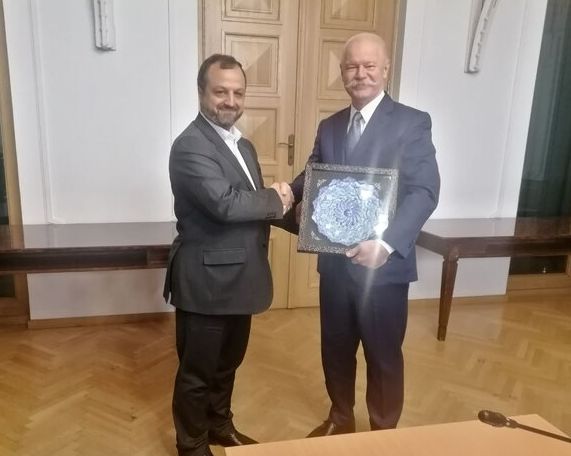
As Iran faces a serious shortage in medicines with some prices rising sevenfold, the Islamic Republic says it is ready to export medicines to Hungary.

As Iran faces a serious shortage in medicines with some prices rising sevenfold, the Islamic Republic says it is ready to export medicines to Hungary.
Economy Minister Ehsan Khandouzi, who visited Budapest, said Thursday that Tehran is open to joint investment in pharmaceuticals as prices of Iranian products are “lower than foreign competitors.”
The visit and talk of economic cooperation come as Hungary is a member of Nato and EU while Iran is being harshly criticized by the European Union for using intense violence against protesters and supplying drones to Russia to attack Ukraine.
The minister’s claim comes as much of the raw materials needed for producing medicines in Iran is imported. The Islamic Republic is also dependent on imports for most of the drugs needed to treat life-threatening ailments such as cancer and coronary disease.
Most medicines in Iran are produced locally by quasi-governmental companies. When the Iranian currency began to nosedive in early 2018, the government offered a fixed exchange rate for essential goods, mainly food and medicines.
However, earlier this year, the new administration of President Ebrahim Raisi eliminated what was in fact a government subsidy. Now, food and medicine producers must buy dollars at rates seven times higher to import their raw materials, which has disrupted domestic production.
Reports from Iran say that people cannot even find painkillers, IV fluids, and antibiotics at pharmacies.

Social media users in Iran say following the designation of Abr Arvan company by the European Union many websites are not disrupted anymore and can be accessed easily.
According to digital activists, after the EU sanctioned Abrarvan, the company lost the servers it was using in Europe and is unable to censor Iran's internet anymore.
Arvan Cloud or Abr Arvan is an Iranian IT company supporting the Iranian government’s efforts to control access to the Intranet in Iran.
The European Union sanctioned the company on November 14 for its role in disrupting the internet to pave the ground for the regime to crack down on protests following the death of Mahsa Amini.
The EU says since 2020, Abr Arvan has been a major partner in the project of the Iranian government, in general, and the Iranian Ministry of Information and Communications Technology, in particular, to set up a separate, Iranian version of the internet.
“Such a national intranet with connecting points to the global internet will help to control the flow of information between the Iranian intranet and the global internet,” said the EU.
According to the EU, Abr Arvan is involved in censorship and efforts of the Iranian government to shut down the internet in response to recent protests in Iran.
“It is also associated with persons responsible for serious human rights violations in Iran, notably the EU-listed Iranian Minister of Information and Communications Technology.”
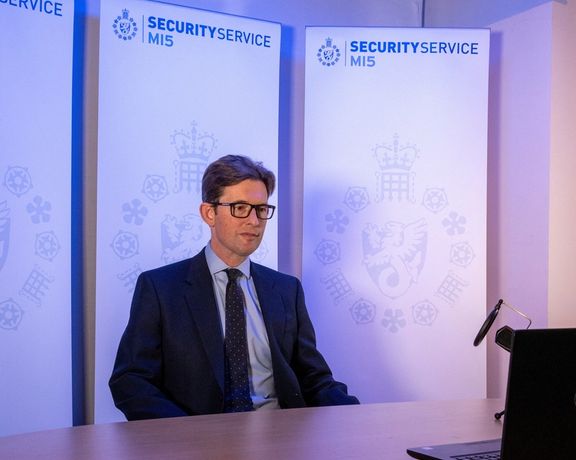
Britain’s MI5 has said Iran poses a major security threat for the United Kingdom as it uses “coercion, intimidation, and violence to pursue its interests.
MI5 Director General, Ken McCallum said Wednesday that except Russia and China, the Islamic Republic is a “mounting concern.”
During his annual threat update in Thames House, London, he underlined that Iran is a state actor which most frequently crosses into terrorism.
“Iran projects threat to the UK directly, through its aggressive intelligence services. At its sharpest this includes ambitions to kidnap or even kill British or UK-based individuals perceived as enemies of the regime,” added McCallum.
He went on to say that UK authorities have discovered at least 10 “potential threats” since January to “kidnap or even kill British or UK-based individuals perceived as enemies of the regime.”
Some UK politicians have demanded a tougher stance toward the clerical government in Tehran.
Elsewhere in his remarks, McCallum noted that “We work at pace with domestic and international partners to disrupt this completely unacceptable activity. The Foreign Secretary made clear to the Iranian regime just last week that the UK will not tolerate intimidation or threats to life towards journalists, or any individual, living in the UK.”
The UK summoned Iran’s ambassador last week as the regime is accused of threatening journalists working in Britain. The UK-based Iran International TV network said last week that two of its journalists had recently been notified of the threats.
In a statement Volant Media, the parent company of Iran International, said “The Metropolitan Police have now formally notified both journalists that these threats represent an imminent, credible and significant risk to their lives and those of their families. Other members of our staff have also been informed directly by the Metropolitan Police of separate threats.”
Speaking about the recent protests in Iran, UK’s top domestic security chief stated the regime is resorting to violence to silence critics who are asking fundamental questions of the totalitarian regime. However, he raised hope that this could “signal profound change, but the trajectory is uncertain.”
The current protests in Iran, which started in mid-September after Mahsa Amini, a young woman was killed in the custody of ‘morality police’, have lasted nearly two months, the longest and most serious challenge to the Islamic Republic, which has one of the largest trained and well-equipped suppression machines in the world.
So far, security forces have killed more than 340 protesters, according to human rights monitors and arrested an estimated 14,000 people. Just during protests on Wednesday around 10 protesters and bystanders were killed.
During his Wednesday comments, McCallum also blamed Iran as a regime that with its proxies, remains a profoundly destabilizing actor in its region and beyond, adding that the Islamic Republic provides support to Russia, including by supplying the drones inflicting misery in Ukraine.
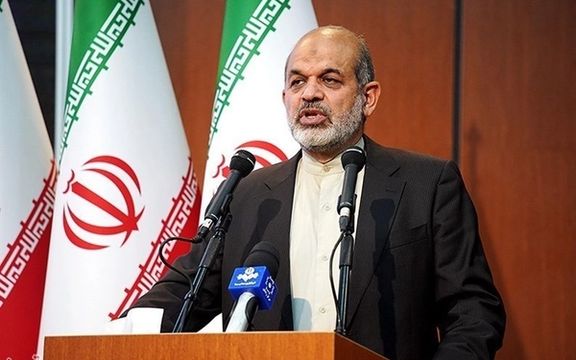
The Islamic Republic says it has arrested several French "intelligence agents" in relation to the ongoing antigovernment rallies, reiterating claims of foreign involvement in protests.
Interior Minister Ahmad Vahidi told state TV on Wednesday, "People of other nationalities were arrested in the riots, some of whom played a big role. There were elements from the French intelligence agency and they will be dealt with according to the law."
Islamic Republic is outraged over Paris voicing solidarity with Iranian protesters and dissidents. Last week, President Emmanuel Macron met Iranian female activists and hailed the protests as a “revolution”.
Since the beginning of the current wave of protests, ignited by the death in custody of 22-year-old Mahsa Amini, the Islamic Republic has accused several Western countries of stoking nationwide protests.
Last week, France's Foreign Minister Catherine Colonna said a total of seven French nationals were detained in Iran.
In early October, France accused the Iranian regime of “dictatorial practices” after Iran’s state TV aired the forced confessions of two French nationals arrested in the Middle Eastern country ruled by its 83-year-old anti-West ruler, Ali Khamenei.
Human rights organizations accuse Iran of a systematic policy of hostage taking over four decades from the earliest period of the Islamic Republic after the ouster of the Shah, starting with the 1979-1981 siege at the US embassy in Tehran.
Tehran denies any policy of hostage taking and insists all foreigners are arrested and tried according to legal process. However, it has frequently shown readiness for prisoner exchanges and participated in swaps in the past.

The presence of Iran’s national football team in Qatar’s World Cup has sparked controversy as the country is convulsed with antigovernment protests and many people expect athletes to support the uprising.
The Iranian squad – nicknamed Team Melli – met with President Ebrahim Raisi hours before departing for Doha, irking many Iranians who did not expect the players to be so blithe about the current uprising across the country. They have been heavily criticized on Twitter since the meeting.

During the nationwide protests on Tuesday, people also set fire to a government banner of the national team.
During the past few days, Iranian legendary striker Ali Daei and outspoken star Ali Karimi, who has been charged in absentia for supporting the protests, said they rejected invitations by Qatar to watch the World Cup matches.
Declining the invitation, Ali Karimi told President Tamim bin Hamad Al Thani in a letter released on Tuesday that “As you know, the people of Iran are currently going through a very difficult time. The international media largely ignores our struggles. Right now, there are more important issues for me than Football and I want to be with my people and be their voice.”
During a press conference earlier on Tuesday, national team coach Carlos Queiroz claimed the players are free to join in the protests while they are playing at the World Cup in Qatar but must do so within the rules of the tournament.
“You express yourself in football according to those principles and values. Everybody has the right to express themselves,” he said.
Addressing a reporter who asked about the current situation in Iran, Queiroz said, “You guys are used to kneeling in the games and some people agree, some people don't agree with that, and in Iran it's exactly the same, but it is out of question to think that the Iran national team is suffering any sort of issues like that, the players only have one thing in mind, which is to fight for that dream to be in the second round.” The Iranian national team has failed in its five previous World Cup appearances to reach the second round.
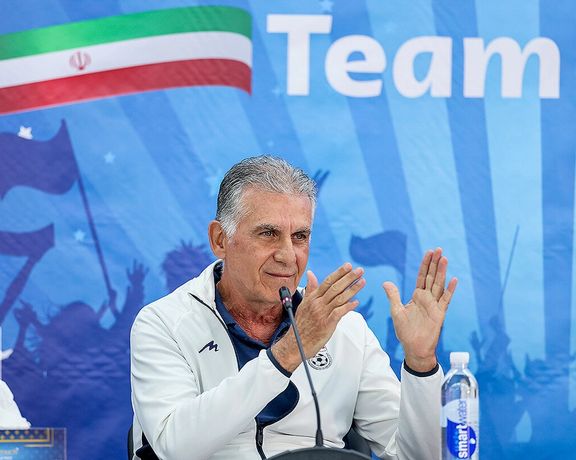
Queiroz was asked whether he was proud to coach a country that repressed women. In a terse retort, the coach asked the reporter how much he would pay him to answer the question, before adding the reporter should think about the issue of immigration in the UK first.
The Iranian government is extremely worried about protests by fans or even players during the games and wants to make sure people will not see any manifestations on satellite TV. The state broadcaster can always cut away during live matches.
It is most probably for this reason that the Qatari government has denied accreditation to Iran International’s journalists from traveling there to cover the World Cup.
Although FIFA has issued ID cards for our correspondents, the Qatari interior ministry denied accreditation.
Last month, Iranian President Ebrahim Raisi expressed concern over possible problems that may happen during the FIFA World Cup, tacitly referring to people chanting slogans against the Islamic Republic during matches or players making statements about the situations in Iran. Earlier in November, he tasked the Foreign Ministry to contact Qatari officials regarding the issue to find ways “to predict and prevent possible problems."
Team Melli players covered up their national team badge when they played two warm-up internationals in September, which was interpreted as a sign of support for the protests, but other national teams and athletes have been more vocal and direct in their support for the protests.
In less than a month, the pace of the athletes showing support for the protests has accelerated as the Iranian football, beach football, waterpolo, basketball, and sitting volleyball teams refused to sing along with the anthem, which is customary in almost all international competitions. Now with the biggest sporting event on the horizon, the regime is resorting to whatever it can to stifle the voices of dissent. Authorities have made serious threats against athletes and other celebrities to stop them from public displays of solidarity with protesters but to no avail.
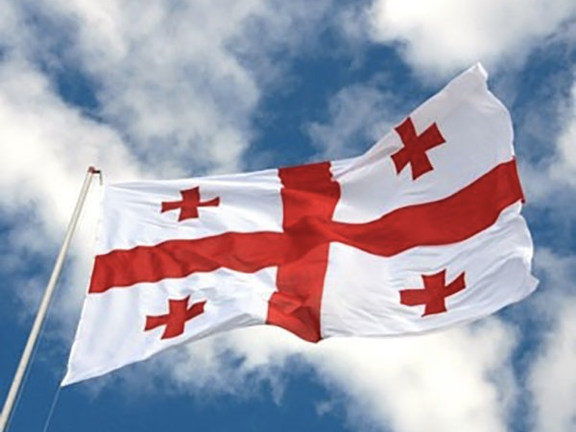
Georgia’s security officials said Tuesday they have foiled an Iranian plot to assassinate an Israeli citizen on their soil.
The murder had been planned by Iran’s Revolutionary Guard Quds Force which conducts overseas operations of the IRGC.
The plan was to kill Itzik Moshe, a businessman who worked to advance Israel-Georgia ties.
The State Security Service of Georgia released a statement on Tuesday saying the man planning the attack has been arrested, and the one who apparently ordered the murder is identified as an Iranian national working outside Georgia.
The security agency also said several people were arrested in the course of the investigation, including Georgians who held dual citizenship with Iran or Pakistan.
Dual Iranian-Georgian citizens residing in Georgia delivered weapons to a Pakistani hit man without meeting him directly; rather, they used hiding places for the weapon transfer, added the statement.
The news from Georgia came months after Israeli and Turkish intelligence agencies worked together to stop an Iranian plot to assassinate Israeli tourists in Istanbul. Jerusalem warned Israelis not to visit Turkey in June, and soon after, Turkey arrested eight members of an Iranian cell in hotel rooms in a popular tourist district, with weapons and ammunition.
Last October, Cyprus foiled an Iranian plot to attack Israelis, including billionaire Teddy Sagi, which Tehran denied. Cypriot authorities arrested a Russian-Azeri man who had a loaded pistol with a silencer in his rented car.